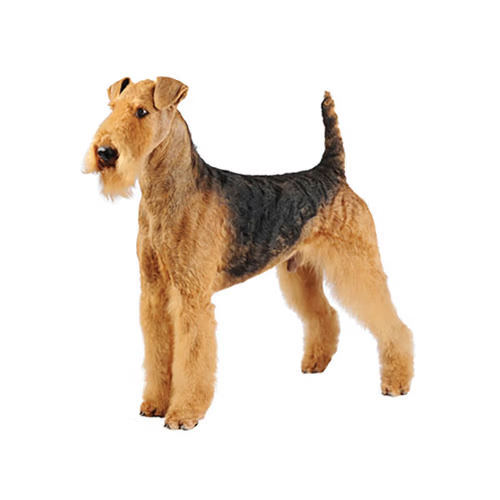
Airedale Terrier
The largest of the terrier breeds, the Airedale Terrier originated in the Valley of Aire in England, where factory workers bred him to be a good hunter, a strong, intelligent guard dog and a companion. The Airedale Terrier is a sturdy breed with a hard, wiry coat that became known as a “jack of all trades” doing police work, rodent control and hunting game. Airedales need grooming several times a year plus weekly brushing.
DID YOU KNOW? Among famous Airedale Terrier owners are Presidents Woodrow Wilson, Warren Harding and Calvin Coolidge.
The need-to-know
- Dog suitable for owners with some experience
- Some training required
- Enjoys active walks
- Enjoys walking one to two hours a day
- Large dog
- Minimum drool
- Requires grooming every other day
- Non hypoallergenic breed
- Chatty and vocal dog
- Guard dog. Barks and alerts
- May require training to live with other pets
- May require training to live with kids
Personality

In common with most terrier dog breeds, the Airedale dog is confident, bold and outgoing. They are loyal, friendly, curious, energetic dogs who are fun loving, eager and tireless. They are devoted to their family and will protect them if they feel it is necessary. Airedale Terriers can sometimes be reserved with strangers and may not be entirely friendly to unknown dogs. While mostly kind and docile, they are the kind of plucky, fearless dogs that while they might not start a fight, will always finish one. A typical terrier, they may not be reliable with small furry animals and cats.
History and Origins

Country of Origin: England
Known as the ‘king of the terriers’ the hardy Airedale Terrier was created in the 19th century in the Aire, Wharfe and Calder river valleys of Yorkshire by hunters who wanted a terrier to help protect the fishermen’s catches from otters. They were developed from crosses from the now extinct Black and Tan Terrier to give them the rough coat, the Otterhound to give them the nose, and the Bull Terrier to give them tenacity. While they were primarily developed as otter hunters, they quickly found other jobs including as a duck-catcher, a ratter, a gun dog, a guard dog, an army messenger dog and even a transport police patrol dog.
Nutrition and Feeding

Airedale Terriers need to have a balanced diet including the main nutrient groups and a constant supply of fresh water. It's important to conduct regular body condition scores to ensure you keep your dog in ideal shape and remember to feed him at least twice daily and in accordance with the feeding guidelines of his particular food. The Airedale dog breed is prone to bloating and stomach problems. Smaller, more frequent meals can help minimise this risk.
Exercise

An active dog, the Airedale breed needs a moderate amount of dog exercise (1 to 2 hours daily), including dog games and training, to prevent boredom and to keep him fit and healthy.
Other Information

Health and common issues
The Airedale dog is generally a hardy breed. As with many breeds, they can suffer from hip dysplasia (a condition that can lead to mobility problems). Hip scoring of dogs prior to breeding is therefore important.
Space requirements
The Airedale Terrier is a large dog who enjoys space and so needs a large-ish house and garden - plus space to exercise so they are best in a rural environment.
Training airedale terriers
The Airedale is a joy to train and they love working with their owners although they do need to be kept motivated with reward-based dog training and plenty of variety. They can excel at dog sports such as agility and can become experts at scent work and love to have a job to do. They do need early and ongoing socialisation to ensure they stay reliable around other dogs and should be taught a strong recall.
Best family dog breeds
Airedales are generally gentle with children although may be too big for younger ones. They are best suited to active families with older children. While many dogs are traditionally thought of as being good with children, all dogs and children need to be taught to get on with each other and be safe together. Even so, dogs and young children should never be left alone together and adults should supervise all interactions between them.
Did you know?
Airedales have been extremely popular with US Presidents - and in fact three presidents in a row all had Airedales called Davie, Laddie Boy and Paul Pry respectively.